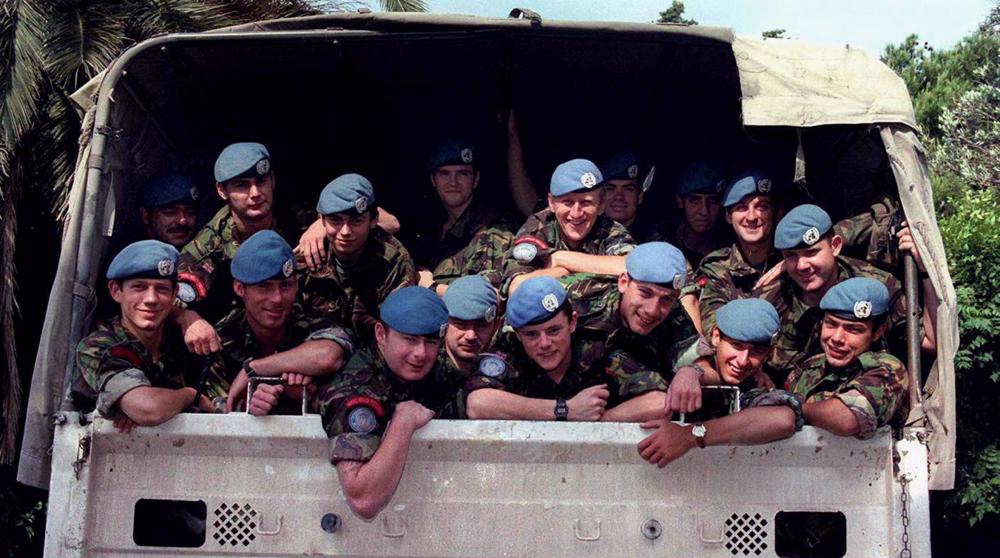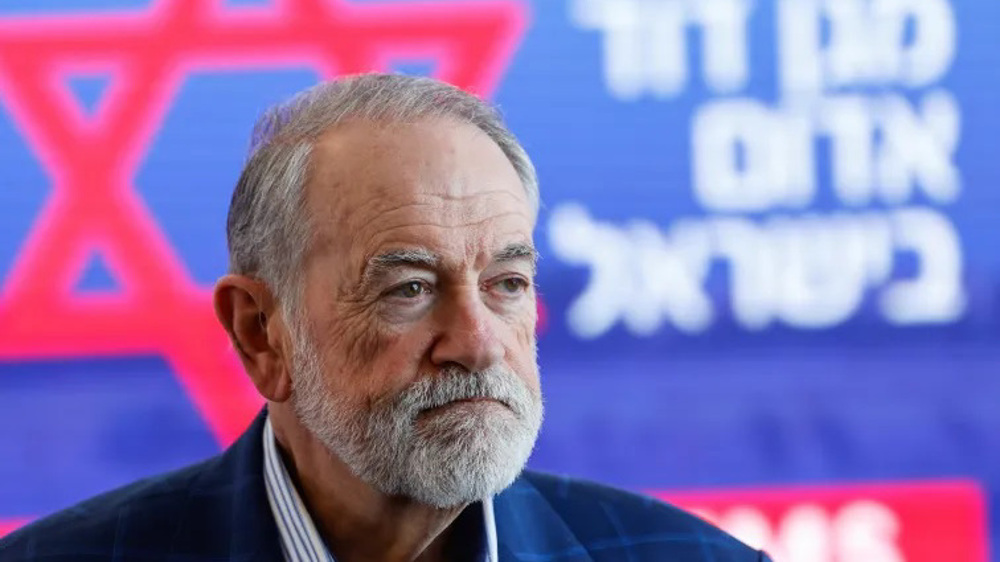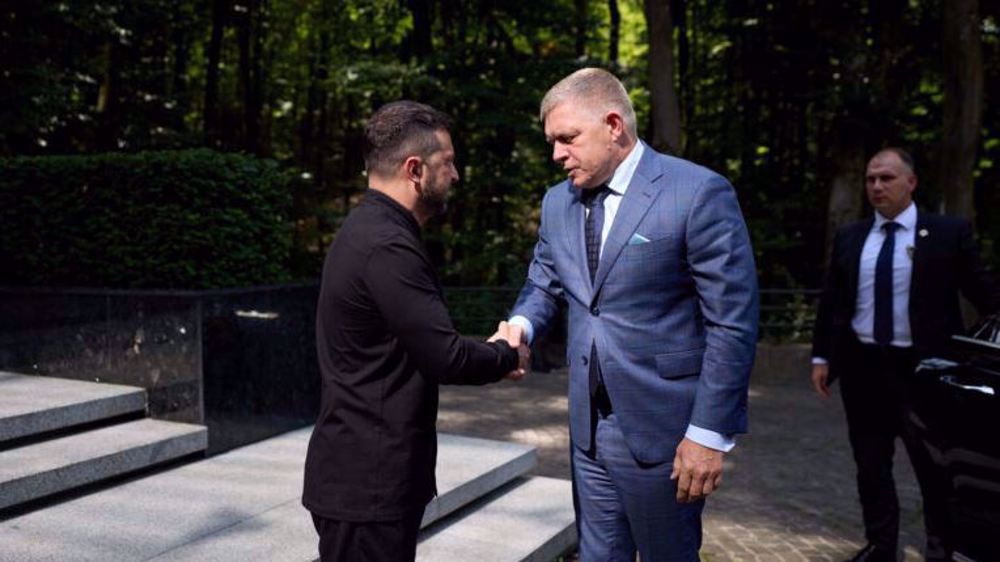UK planned Srebrenica pullout despite being aware of imminent carnage: Released docs
Declassified documents show the UK devised plans to withdraw troops from a besieged Muslim enclave at the height of the Serbian onslaught in Bosnia in July 1995 despite being aware of mass killing of thousands by local Serb forces in nearby Srebrenica.
Nearly 8,300 Muslim men and boys were later found to have been murdered at Srebrenica after the Dutch contingent of the United Nations so-called “peacekeeping force” deployed in Bosnia withdrew from the town.
The Srebrenica massacre – for which Bosnian Serb leaders were later convicted of genocide -- remains the single worst atrocity conducted on European soil since the end of World War II more than a quarter of a century later as the UK-based Middle East Eye news outlet reveals new details in a Friday report about how Western powers and the UN contributed to other atrocities committed in Bosnia.
The report, which used declassified British government documents about Bosnian crisis, also points to a new, widely acclaimed, Bosnian movie – Quo Vadis, Aida? – that sheds new light on the tragic carnage in Srebrenica and what it described as “the catastrophic failure of the UN peacekeeping mission in the region as Yugoslavia collapsed into civil war and ethnic violence.”
Directed by Jasmila Zbanic, a survivor of the near-four-year siege of the major Bosnian city of Sarajevo by local Serb forces, the movie has been nominated as the best international feature film at the 2021 Oscars, and as the best foreign language film at the British BAFTA awards.
According to the released documents, another Bosnian Muslim enclave of Gorazde -- where British soldiers made up the main contingent of UN peacekeepers -- came very close to facing the same fate as Srebrenica.
The documents “paint a vivid behind-the-scenes picture” of Western leaders striving to choose “the least-worst options” presented to them by their advisers, without much regard for the fate of Bosnia’s Muslim population facing massacres and other atrocities that were overtly being carried out by Serbian forces.
They further reveal that then British prime minister John Major was reluctant to reinforce Gorazde in order to protect its population of more than 30,000 despite -- as his private secretary put it -- “the distressing scenes now daily on our television screens.”
The papers further show that the British defense ministry “drafted emergency plans for the evacuation of British troops from the area around Gorazde in July 1995 at the exact moment that genocidal slaughter was underway at Srebrenica and a third enclave, Zepa, had come under attack.”
Gorazde had come under Bosnian Serb attack in 1994, and again in May 1995.
‘Operation Screwdriver’
Gorazde, located on a strategically vital crossroads and surrounded by towering cliffs, was highly vulnerable to another Serbian attack and potential carnage following the fall of Srebrenica and Zepa.
The three eastern towns had been declared safe havens for Muslim Bosniaks by the UN Security Council (UNSC) in 1993 after the surrounding territory had been captured by Belgrade-backed Bosnian Serb forces opposed to Bosnia and Herzegovina’s declaration of independence in 1992, the report noted.
The report also pointed out that UNSC resolutions had also established that UN peacekeepers were only authorized to “deter” attacks on the three enclaves, but not to “protect” or “defend” them. Force could be used only in self-defense.
On 16 July 1995, with a final onslaught against Gorazde thought to be imminent, British plans – “codenamed Operation Screwdriver” -- to evacuate 350 British soldiers from the town were finalized at the Ministry of Defense in London.
According to the report, the disclosure of the British evacuation plans “came as little surprise to men who served in the army of Bosnia and Herzegovina during the civil war.”
It then cited Ferid Buljubasic -- who had served as a lieutenant colonel in the Yugoslav National Army before commanding Bosnian forces in Gorazde from mid-1992 to the end of 1994 – as recalling that the so-called UN Protection Force (UNPROFOR) “were being led largely by officers who did not understand the nature of the war.”
Buljubasic recounted that NATO aircraft in 1994 bombed Serb tanks that had already been destroyed.
“I would say that the role of the international community in general in Bosnia and Herzegovina was very dishonorable,” he said.
“My general impression is that they never understood the character of war in Bosnia and Herzegovina, that they were never neutral, that they faked execution of their tasks and there is so much evidence that they were extremely inclined towards Serbs,” he further emphasized.
“They ignored and disregarded the government of Bosnia and Herzegovina as well as the Army of Bosnia and Herzegovina. There was politics in all that.”
The released documents also make clear that the British prime minister at the time was determined that the UK should not be sucked into a war with Bosnian Serb forces, and that his senior military commander, Field Marshal Peter Inge, fully supported the decision.
Buljubasic further pointed out that a group of 20 British Special Air Service soldiers had been hurriedly evacuated from Gorazde while the enclave came under attack in April 1994.
They had been posted to the town as the “eye and ears” of UNPROFOR commander Michael Rose, who was himself a British general, he noted.
“When they came, they were pumped up, dressed, they had vests, all sorts of things, camouflage paint. The very moment it got troubling, they vanished,” Buljubasic added.
“As the attacks went on, and as the Chetniks [Bosnian Serb forces] were getting close to Gorazde, one night, those SAS – a helicopter came to pick them up – they took their stuff and ran away without letting anyone know, without anything. They just disappeared, they just, one night, vanished.”
“The behavior of the forces of UNPROFOR would have been identical (to the Dutch at Srebrenica), if not even more shameful,” the former Bosnian commander observed.
US, UK backed Dutch pull out from Srebrenica
US President Bill Clinton, meanwhile, was expressing his frustration at the Bosnian government while they were struggling to defend themselves amid a UN-imposed arms embargo whereas the Bosnian Serb forces had inherited large amounts of weaponry from the army of the former Yugoslavia.
During a telephone conversation with Major, Clinton was recorded to have said, “We could hardly blame the Dutch for leaving Srebrenica, when the Bosnians themselves had already given up the fight.”
He further claimed, “The Bosnians made a habit of trying to make other people look bad in the press.”
The report points out that “some sections of the British record of these Clinton-Major telephone conversations remain redacted, more than a quarter-century later, on national security grounds,” following the 2019 declassification of the bulk of the UK government papers on the period.
Following the fall of Srebrenica and the attack on Zepa underway, Major concluded that the Bosnian Serbs would next turn on Gorazde as the British ambassador in Belgrade reported that the Bosnian Serb army was “on a high” after capturing Srebrenica with so little UN opposition, and was dangerously unpredictable.
Major, however, told both French president Jacque Chirac and Clinton that he believed only diplomatic pressure should be applied in an attempt to save the Gorazde.
The Americans, according to the report, regarded Gorazde as a problem for the UK and France to deal with, and regarded the defense of Sarajevo as “a more serious strategic objective.”
The top British commander in Bosnia, Field Marshal Peter Inge, recommended that if the UK government decided its troops should remain in Gorazde, “we [should] do so as robustly as possible under a pure peacekeeping and humanitarian mandate option, and then seek a negotiated withdrawal with dignity as the Dutch have done but being prepared to use air power.”
The declassified documents also suggest that his description of the Dutch withdrawal from Gorazde as having been performed “with dignity” may have been calibrated with London’s position.
A few days earlier, a furious Chirac had publicly denounced what he described as the “cowardice” of the 700 Dutch troops who had abandoned Srebrenica.
Knowing that plans were being drawn up for the evacuation of British peacekeepers from Gorazde, Major called then Dutch Prime Minister Wim Kok to tell him he had been “outraged” by Chirac’s remarks.
Major also stated that he had just spoken to Clinton, “who had been similarly incensed.”
The UK Foreign Secretary at the time, Malcolm Rifkind, also praised Kok in a telegram that read, “The United Kingdom considers that the Dutch peacekeepers in Srebrenica did their duty magnificently and with great courage. The Netherlands can be proud of them.”
Meanwhile, Srebrenica continued to haunt the Netherlands for years. Kok resigned in 2002 -- along with his entire cabinet -- after an official Dutch report laid much of the blame for the unprecedented massacre at the door of the country’s political and military leadership, as well as the UN.
The failure to act has not similarly haunted the UK, however, according to the report, which cited then US ambassador to the NATO military alliance, Robert Hunter, as saying, “Britain has a huge burden of responsibility for what happened at Srebrenica,” further noting that responsibility for “NATO’s failure to act lay in London.”
Douglas Hurd, who had been UK foreign secretary until a few weeks before the Srebrenica massacre and had earlier suggested that lifting the arms embargo would create “a level killing field,” wrote later that “humility is in order for those of us who handled policy towards Bosnia.”
Major also wrote years after the massive genocide in Bosnia that “as a leader of one member of the international community I accept the blame that must fall on all our shoulders for the inadequacy of the outside world’s response to the crisis both then and in subsequent years.”
IRGC, Army launch fresh waves of missile strikes against Israeli, US targets
Red Crescent Society: 555 people killed across Iran in US-Israeli onslaughts
Operational concerns delayed US-Israeli aggression against Iran for a week: Report
Iran slams Israeli attacks on Lebanon, warn UNSC’s inaction to embolden regime
Iran says has ‘no choice’ but to fight back, holds no enmity toward American people
Bahraini police assaults crowds mourning loss of Ayatollah Khamenei
Iran posed no imminent threat to US: Pentagon tells Congress
Iran will hold no negotiations with US: Larijani










 This makes it easy to access the Press TV website
This makes it easy to access the Press TV website